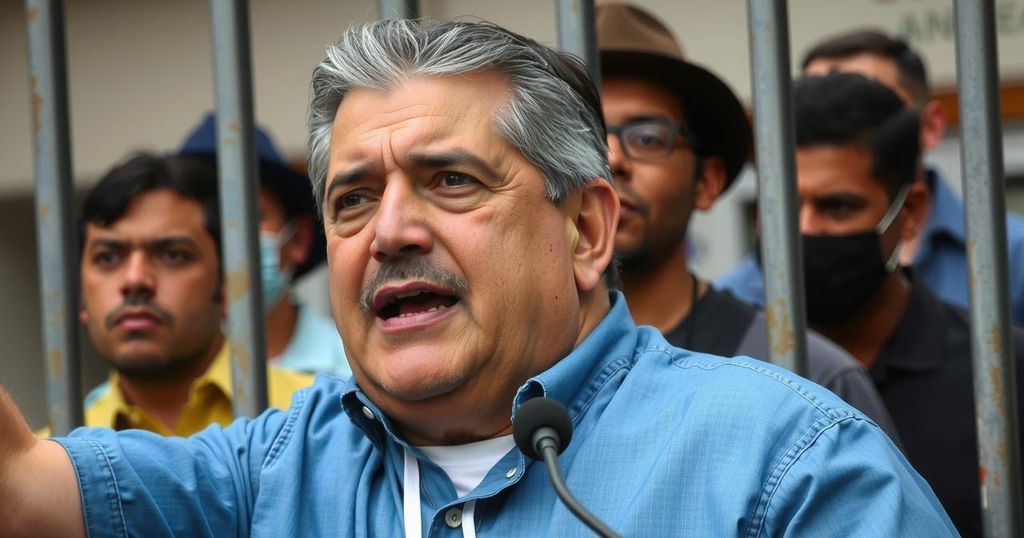Politics
CHA, CHAVISTA MOVEMENT, CITIZEN SECURITY AND PEACE, CORRUPTION, CUBA, DEMOCRACY, DI, DIOSDADO CABELLO, EDMUND, EDMUNDO GONZÁLEZ URRUTIA, EUROPE, HUMAN RIGHTS, MADURO, NATIONAL ELECTORAL COUNCIL, NORTH AMERICA, OPPOSITION, POLITICS, PRESIDENTIAL ELECTION, SOUTH AMERICA, SPAIN, VENEZUELA
Isaac Bennett
0 Comments
Maduro Announces Release of Protesters Amid Legitimacy Crisis in Venezuela
President Nicolás Maduro has announced the release of over 100 detained protesters in a bid to alleviate pressure following contentious elections that led to over 2,000 arrests. Despite this, human rights organizations express skepticism regarding these releases, noting severe allegations of repression. The situation underscores the ongoing legitimacy crisis faced by Maduro’s administration as it prepares for an imminent inauguration, amidst heightened scrutiny from the international community regarding human rights violations.
In a strategic move aimed at alleviating mounting pressure, President Nicolás Maduro has announced the release of over 100 individuals who were detained following last month’s contentious elections in Venezuela. This latest measure complements an earlier conditional release of 225 detainees, although human rights organizations remain skeptical about the total number of confirmed releases. The situation escalated post-election, leading to a surge in arrests, with reports indicating that more than 2,000 individuals were detained during protests against the election results amidst assertions of electoral fraud by the opposition.
Among those released, a significant portion are minors aged between 14 and 17, causing international outcry and prompting their families to organize continuous protests and vigils for their freedom. Most of the detainees face serious charges such as terrorism, often based on perceived political affiliations or possession of anti-government materials. This context reveals Maduro’s attempt to mitigate the legitimacy crisis his administration faces as he prepares for an imminent inauguration.
As the regime braces for further scrutiny from the international community following the controversial elections, incidents of repression have intensified, compelling human rights organizations to investigate possible violations committed by the state. Notably, the International Criminal Court continues to examine claims of arbitrary detentions and brutality against political figures, emphasizing the urgency of the human rights landscape in Venezuela. Additionally, concerns over the fate of dual nationals, including activists arrested under dubious circumstances, have exacerbated global condemnation of the Maduro government’s actions.
Despite these conditional releases, the Chavista administration faces increasing criticism regarding its treatment of dissenters, illustrating a complex political climate that intertwines human rights with the fight for power. Consequently, prominent groups, including Human Rights Watch, have called for transparency regarding missing individuals, fueling the narrative of enforced disappearances prevalent in contemporary Venezuela. The ongoing situation underscores the intricate dynamics between governmental authority and civil rights in a country grappling with profound political unrest.
The political landscape in Venezuela has been marred by controversy and unrest, particularly following the recent presidential elections. Allegations of fraud and a lack of transparency in electoral processes have resulted in widespread protests and significant civil disobedience, culminating in a surge of arrests. The government’s response has involved both repression and strategic releases of political detainees in an attempt to quell international scrutiny and domestic unrest, raising critical questions about human rights and democratic governance in the region.
In conclusion, President Maduro’s announcement regarding the release of over 100 detained protesters highlights the ongoing tensions following the controversial elections in Venezuela. The situation remains fluid as the international community and human rights organizations continue to scrutinize the actions of the Venezuelan government in light of persistent allegations of human rights abuses and political repression. The delicate balance between maintaining power and upholding democratic principles poses significant challenges for the Chavista regime in the weeks ahead.
Original Source: english.elpais.com




Post Comment